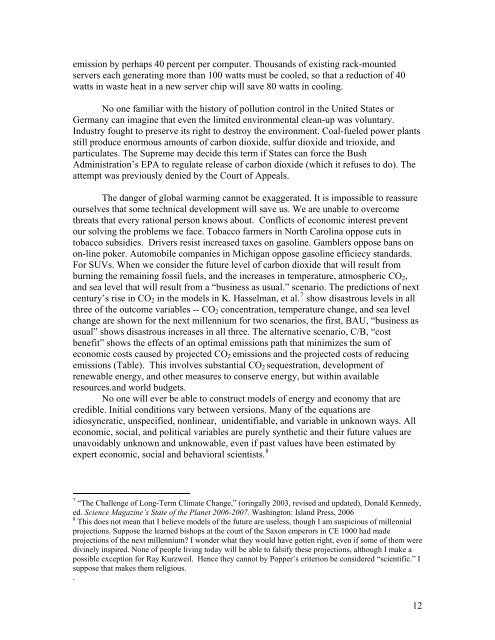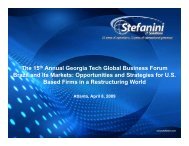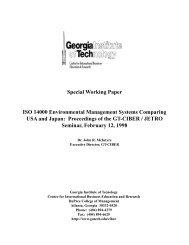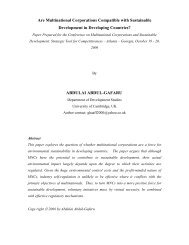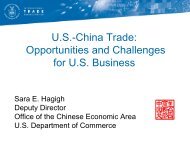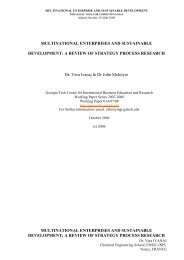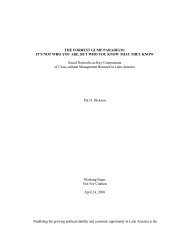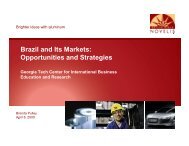AMD vs Intel: Technology, Competition, and Sustainability
AMD vs Intel: Technology, Competition, and Sustainability
AMD vs Intel: Technology, Competition, and Sustainability
You also want an ePaper? Increase the reach of your titles
YUMPU automatically turns print PDFs into web optimized ePapers that Google loves.
emission by perhaps 40 percent per computer. Thous<strong>and</strong>s of existing rack-mounted<br />
servers each generating more than 100 watts must be cooled, so that a reduction of 40<br />
watts in waste heat in a new server chip will save 80 watts in cooling.<br />
No one familiar with the history of pollution control in the United States or<br />
Germany can imagine that even the limited environmental clean-up was voluntary.<br />
Industry fought to preserve its right to destroy the environment. Coal-fueled power plants<br />
still produce enormous amounts of carbon dioxide, sulfur dioxide <strong>and</strong> trioxide, <strong>and</strong><br />
particulates. The Supreme may decide this term if States can force the Bush<br />
Administration’s EPA to regulate release of carbon dioxide (which it refuses to do). The<br />
attempt was previously denied by the Court of Appeals.<br />
The danger of global warming cannot be exaggerated. It is impossible to reassure<br />
ourselves that some technical development will save us. We are unable to overcome<br />
threats that every rational person knows about. Conflicts of economic interest prevent<br />
our solving the problems we face. Tobacco farmers in North Carolina oppose cuts in<br />
tobacco subsidies. Drivers resist increased taxes on gasoline. Gamblers oppose bans on<br />
on-line poker. Automobile companies in Michigan oppose gasoline efficiecy st<strong>and</strong>ards.<br />
For SUVs. When we consider the future level of carbon dioxide that will result from<br />
burning the remaining fossil fuels, <strong>and</strong> the increases in temperature, atmospheric CO 2 ,<br />
<strong>and</strong> sea level that will result from a “business as usual.” scenario. The predictions of next<br />
century’s rise in CO 2 in the models in K. Hasselman, et al. 7 show disastrous levels in all<br />
three of the outcome variables -- CO 2 concentration, temperature change, <strong>and</strong> sea level<br />
change are shown for the next millennium for two scenarios, the first, BAU, “business as<br />
usual” shows disastrous increases in all three. The alternative scenario, C/B, “cost<br />
benefit” shows the effects of an optimal emissions path that minimizes the sum of<br />
economic costs caused by projected CO 2 emissions <strong>and</strong> the projected costs of reducing<br />
emissions (Table). This involves substantial CO 2 sequestration, development of<br />
renewable energy, <strong>and</strong> other measures to conserve energy, but within available<br />
resources.<strong>and</strong> world budgets.<br />
No one will ever be able to construct models of energy <strong>and</strong> economy that are<br />
credible. Initial conditions vary between versions. Many of the equations are<br />
idiosyncratic, unspecified, nonlinear, unidentifiable, <strong>and</strong> variable in unknown ways. All<br />
economic, social, <strong>and</strong> political variables are purely synthetic <strong>and</strong> their future values are<br />
unavoidably unknown <strong>and</strong> unknowable, even if past values have been estimated by<br />
expert economic, social <strong>and</strong> behavioral scientists. 8<br />
7 “The Challenge of Long-Term Climate Change,” (oringally 2003, revised <strong>and</strong> updated), Donald Kennedy,<br />
ed. Science Magazine’s State of the Planet 2006-2007. Washington: Isl<strong>and</strong> Press, 2006<br />
8 This does not mean that I believe models of the future are useless, though I am suspicious of millennial<br />
projections. Suppose the learned bishops at the court of the Saxon emperors in CE 1000 had made<br />
projections of the next millennium? I wonder what they would have gotten right, even if some of them were<br />
divinely inspired. None of people living today will be able to falsify these projections, although I make a<br />
possible exception for Ray Kurzweil. Hence they cannot by Popper’s criterion be considered “scientific.” I<br />
suppose that makes them religious.<br />
.<br />
12


